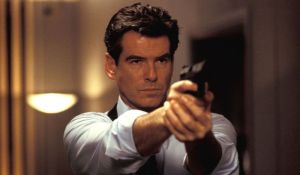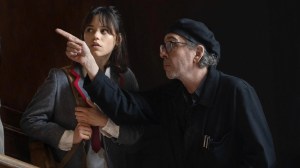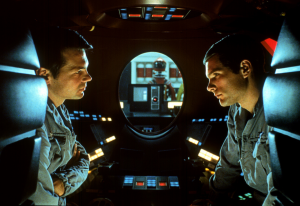
Ever since fans first met Dory, the adorable Blue Tang fish with a questionable memory in Finding Nemo, fans have wanted to learn more about who she is and where she came from. Now, we’re just days away from the release of Finding Dory and we’ll finally learn more about what her life was like before running into Marlin.
Videos by ComicBook.com
ComicBook.com had the opportunity to chat with producer Lindsey Collins (Wall-E, Ratatouille) and screenwriter/co-producer Andrew Stanton (Finding Nemo, Toy Story) about the film where they provided some great insight into this summer’s big animated feature.
How does it feel to be doing a sequel to Finding Nemo some thirteen years later?
Andrew Stanton: It’s a long time to do fish. If you combine the two movies, eight years is a long time to spend with fish.
Lindsey Collins: It was.
AS: Four years on all the movies, yeah, so you’ve got to be careful about what you choose. I mean, that’s one of the things I knew very well – okay, do I want to be on this thing that two years from now is not going to be my friend, everything’s going to be going wrong, and I going to want to get out of bed? Do I want to see the possibility of the end result of this thing that badly? And, I did.
LC: You have to be very conscious when you go into it. I think it’s very stressful as well. You have to ask: do I love these characters enough to invest four more years of my – honestly – and, then I think you have to feel like you want to be – not only with the people you are working with on a daily basis – but, the characters you are with for four years. It can get, you know, it’s tiring, but it’s also – as I imagine we would both say – it’s also incredibly rewarding and it doesn’t always feel that way, but man, when that shot in the arm comes of: okay, we’re not crazy. This is how we need to do this. We just got together and watched everybody else react to it and it’s probably one of the better feelings.
AS: It must be – I mean, I don’t know what this is like – but, I want to imagine it must be what it’s like to write for an orchestra – be a good arranger – but, you never really get the pleasure of hearing it until the very end when the orchestra all plays it and, so you’re doing it on the piano – you might be doing a little bit of accompaniment – but, you’re never seeing.
LC: You’re never seeing the whole thing.
AS: You’re so projecting and guessing. I don’t know how people do that and – in a weird way – it’s what we do, but we’re saying that in four years, somewhere in the last year, we’re going to get to know what it’s like.
LC: Right, the orchestra will play it.
AS: This whole darn thing and it’s a big risk, but I’ve yet to not be blown away by what it’s like by the time the orchestra plays.
Can you tell us a bit about the sound design?
AS: The sound design is everything, but you don’t want to get seduced by that. What we try to do is make it so that you enjoy the scene even before there’s any sound design or any music, any of the real voices. If you can make it even slightly engaging and enjoyable then, you know you’ve got – you’re on good ground – ’cause it’s only going to get better. You don’t want it to be saved by that stuff.
I would assume that would start with the script.
AS: It does. You try to really make it whole at every stage, but it rarely is a slam dunk. I mean, there’s no hard fast rule, but typically, let’s say there’s 35 scenes in a movie – typically, there’s only two or three [scenes] that, from the get go, you go, “This is going to be a great scene.” and, then the rest of it? Half of it you’re like, “We’ve got nothing. Nothing at all.”
LC: And, then that is the job is, then trying to figure out which two those are because, then you have to put two in. You have to guess right because everything else is going to change.
AS: It’s all a game to buy you time to make the scenes that still don’t work better. You put them back in the machine.
LC: Yeah, it’s a game. It’s a game of timing like, “When are we going to put that in?” ’cause f you guess wrong it’s a bummer because you end up wasting a ton of time and having to fix it. It is a game of – it’s a bit of chess.
Have either of your two most brilliant scenes been screened for anyone out of Disney and Pixar yet?
AS: Yeah, one of the first ones that ever went into production was Under Quarantine – the [scene] where [Dory] meets Hank.
LC: That was the first sequence.
AS: That was tough. There’s another scene that hasn’t been seen that is soon after where [Hank and Dory] go to find a map and that scene – and the scene where they meet – were when we finally to click and – because of plotting problems, or plotting changes – suddenly the scene with the mao when backward ’cause we had to change something because of something else. For a while that was the front runner.
It was funny, I don’t know how far in we were – maybe two years? a year and a half? – when that started to come together and you could just feel it. I remember saying, “Oh, it looks like a Pixar movie.” It hadn’t before that. It was just this weird voodoo – more about the chemistry, more that there was tension, that there was drama underlying it all.
We seem to be able – on the surface – seemingly right away to us. It’s funny and it’s entertainment and it’s moving the ball forward, but you don’t sense the stakes or the natural chemistry or drama that’s just existing for these people being in a room together.
With Dory initially being a supporting character who has now moved into the lead – was there always the intention to bring in a character, like Hank, to fill the role that Dory filled in Finding Nemo?
AS: Not right away, no. Victoria Strouse came on very early on to be my writer on it and I had originally thought it was going to be a bit of a – I thought she might have a sister and that’s, sort of, where Destiny [note: a visually impaired whale shark] originally started out was going to be an adopted sister.
LC: The ridiculousness of it.
AS: This giant thing you can’t ignore has replaced you.
LC: Yeah, exactly.
AS: And, so, that’s where that started and, so I brought Victoria on knowing that she would have this great female voice and she was great with family dynamics and stuff like that in other works that she’d done. She was the one that pointed out very quickly when we first put it up that there was just too many balls juggling in the air – we had a lot of other things that were off – and even in that storyline, though, we had problems with Dory needing to get across the park and not having anybody that allowed Dory to really be challenged.
LC: It was going to be too much in pipes by herself. We were like, “We can’t have her by herself with nobody to talk to.” and we have to think of a way to get her around without shoving her in pipes all the time.
Stanton: And, I think an octopus was always, kind of, in the list of things to try, but it wasn’t until – I think we had one scene with [Hank] together with [Dory] for some other reason and – [Victoria] really pushed the idea of [Hank] being a surrogate Marlin. Of him being somebody that just really was curmudgeonly and grumpy with a heart of gold and it really worked and she just naturally went toward that and it really worked and once we said that out loud we realized that we really needed to own that more and it really worked for the whole arch of [Victoria]’s story.
What do you want audiences to take away from Finding Dory?
LC: I think we want them to take away that it’s a movie that feels worthy of the first film and that feels worthy of Dory because we take that responsibility very seriously. We didn’t enter into it, as Andrew said, lightly in terms of knowing what we were getting ourselves into and we also are super aware of everybody’s public [ownership] of Dory. Everybody, kind of, owns Dory, as a character, and, so entering into that game was a very, very conscious decision and, I think, the ultimate goal has always been: does this film feel worthy of the first and does it feel like it’s worthy of her, as a character? Meaning: are we giving her what we want her to have at the end.
AS: A different way that I look at that same thing [Lindsey] just said is: the best compliment would be I can’t imagine this movie not existing. It was always meant to be a part of the canon and that’s what you’re always hoping for, for the exact reasons that she just said.
—-
So what do you think ComicBook.com readers? Are you excited for Finding Dory? Let us know in the comments section!
Finding Dory hits theaters nationwide on June 17, 2016.








